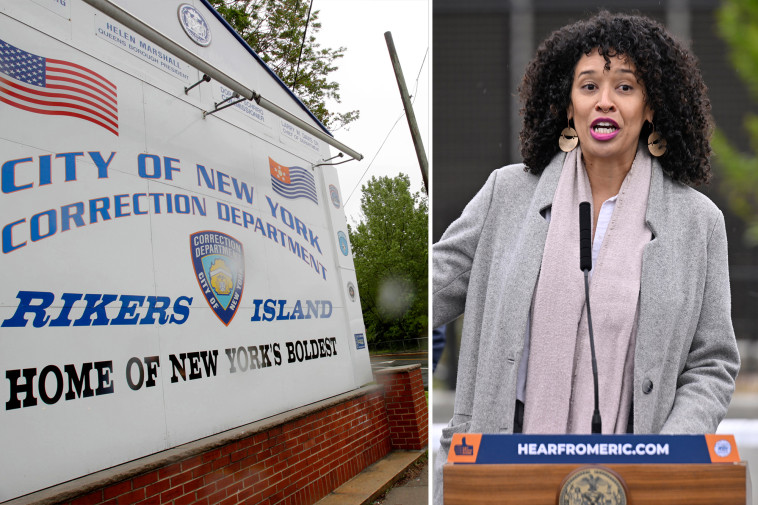Fewer than one in five inmate complaints on Rikers Island over the last four years ever saw any resolution, including shocking claims of sexual assault, according to a review of jail data.
The revelation emerged Wednesday during the City Council’s Committee on Criminal Justice hearing where Department of Correction officials were grilled over the agency’s poor track record with inmate complaints.
“There is an issue here on the island with sexual assault and abuse,” Committee Chair Sandy Nurse (D-Brooklyn) said in Council Chambers. “It is systemic.”
The analysis, conducted by the committee, found fewer than 15% of grievances filed by inmates or third parties through the DOC find a formal resolution, Nurse said.
It also found since 2020 the number of complaints filed per 100 persons in DOC custody has nearly doubled.
“Our analysis shows that grievances have been rising over the last four years, especially complaints coming from the population housed in mental health observation units,” Nurse said. “It is loudly speaking to all of us through the data and the numbers that the grievance process … is not a process to solve things on a systemic level.”
Nurse said the complaints span issues from food to commissary to lack of access to medical care and sexual abuse.
The committee oversight hearing comes on the heels of a disturbing report from Gothamist that alleged a system of sexual abuse against mostly female inmates by health care workers and other employees on Rikers Island.
The outlet’s analysis published in March found 719 lawsuits filed under the Adult Survivors Act against the city DOC or the city of New York alleging sexual abuse at Rikers Island.
In total, the mostly female plaintiffs are seeking more than $14.7 billion in damages. In one alleged instance, a woman said she and other female inmates were removed from their jail cells at night and taken to a dark room where they were forced to perform oral sex on prison guards.
The outlet also found that 32 of the lawsuits alleged female inmates were sexually assaulted during what were supposed to be routine medical examinations on the island between 1986 to 2018. However, most of the incidents happened between 2001 to 2015 when the city hired a private contractor known as Corizon Health to provide medical care to Rikers inmates, the report showed.
Some of the women told the online paper they did not report the assaults out of fear of retaliation, but at least one of the women said they did file a formal complaint, but it was never followed up on.
During the hearing Wednesday, DOC officials cited a “zero tolerance” policy for sexual assault but conceded their process needed to be reevaluated.
“We are actively reviewing the process and how we can provide a speedy response for persons in custody,” Michelle Stafford, executive director of DOC’s Office of Constituent and Grievance Services, testified Wednesday.
Currently, the DOC lumps complaints into one of two categories: “grievable” and “non-grievable.”
The lower level complaints, “grievable,” include allegations about jailhouse operations such as clothing, mail, food, commissary, jail programs and other mostly operational issues and are handled by the OCGS, a civilian unit that handles complaints and is also tasked with connecting with the community.
While the serious allegations, “non-grievable,” such as assault, sexual assault and lack of access to medical care, are given by a uniformed corrections officer.
Barbie Melendez, director of public accountability and oversight for the Board of Corrections, said the investigation into a serious complaint can be intimidating to inmates since it’s handled by a captain and often leads to them dropping their complaints.
“It is not a confidential, quiet space, an environment where people are open to making statements or elaborating more on their grievance issues,” Melendez testified. “Many times it’s intimidating for people in custody to continue with their grievance process because now they are in a housing unit with a paper in front of them.”
Melendez also raised concerns about the lack of regular access to phones limiting their ability to report accusations via 311 — and even if they manage to do so, the complaints often don’t make it to the formal grievance process.
Natalie Fiorenzo, a corrections specialist at New York County Defender Services, skewered the DOC’s lack of any tracking process for complaints with the agency only often using “informal” unwritten communications.
“The people making these complaints are never privy to any information regarding the investigation,” Fiorenzo testified. “They have no means of determining what happened to their complaint, whether it was resolved and how.
“If they are lucky, they might receive some formal resolution paperwork, but instances of this actually happening are few and far between.”
In one grievance detailed by Fiorenzo, her client had been “brutally beaten” by another inmate in plain view of a jail officer who just remarked, “clean yourself up before the captain comes around to do the rounds.”
The injured inmate lodged a complaint, but the DOC quickly closed the complaint saying it was not submitted within the required 10-day timeframe and no further action would be taken.
In another, the same inmate alleged that an officer told him that he would be moved to an unsafe housing area where he would be “dead in three days.”
DOC told the inmate it would be referred to an outside agency, but he has still not heard back months later, according to the hearing.







